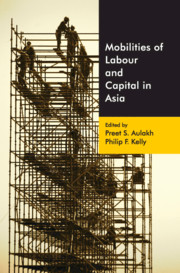Book contents
- Frontmatter
- Contents
- List of Figures
- List of Tables
- List of Appendices
- Acknowledgements
- 1 Introduction: Conceptualizing Labour and Capital Mobilities In and Out of Asia
- SECTION I From Capital to Labour Mobility
- 2 Offshore Spaces: Multi-scalar Bordering Processes and the Segmented Mobilities of Capital and Labour in Asia
- 3 Japanese Multinational Companies and the Control of Overseas Investments: Expatriates, Foreign Employees, and Japan's Soft Power
- 4 Accumulation at the Margins? Mineral Brokerage and Chinese Investments in Philippine Mining
- 5 Soft Power and Transnationalism Affecting Capital and Labour Mobility: Chinese Diaspora in Mexico and Peru
- 6 The Spatial Decoupling and Recombination of Capital and Labour: Understanding the New Flows across the China–South East Asia Borderlands
- SECTION II From Labour to Capital Mobility
- Notes on Contributors
- Index
2 - Offshore Spaces: Multi-scalar Bordering Processes and the Segmented Mobilities of Capital and Labour in Asia
from SECTION I - From Capital to Labour Mobility
Published online by Cambridge University Press: 24 December 2019
- Frontmatter
- Contents
- List of Figures
- List of Tables
- List of Appendices
- Acknowledgements
- 1 Introduction: Conceptualizing Labour and Capital Mobilities In and Out of Asia
- SECTION I From Capital to Labour Mobility
- 2 Offshore Spaces: Multi-scalar Bordering Processes and the Segmented Mobilities of Capital and Labour in Asia
- 3 Japanese Multinational Companies and the Control of Overseas Investments: Expatriates, Foreign Employees, and Japan's Soft Power
- 4 Accumulation at the Margins? Mineral Brokerage and Chinese Investments in Philippine Mining
- 5 Soft Power and Transnationalism Affecting Capital and Labour Mobility: Chinese Diaspora in Mexico and Peru
- 6 The Spatial Decoupling and Recombination of Capital and Labour: Understanding the New Flows across the China–South East Asia Borderlands
- SECTION II From Labour to Capital Mobility
- Notes on Contributors
- Index
Summary
Introduction: Borderless World or a World of Borders?
The optimistic globalist accounts of the 1990s that painted the rise of a ‘borderless’ world (for example, Ohmae, 1990; for a critique see Yeung, 1998) are faded myths today. The second decade of the twenty-first century seems to be more adequately characterized by the instigation of new borders and/or the fortification of existing ones. The rise of populist governments around the world, the shift towards protectionist policies in the USA under Trump, the vote of the UK electorate to exit the European Union, and the migration ‘crisis’ that has emerged in Europe following violent conflicts in close geographic proximity have brought the fortification of borders, fences, and walls back on the agenda of governments and in the broader public view. These borders are generally discussed at the level of the (nation) state. The aim of this chapter is to engage with a less-noticed undercurrent of the multi-scalar process of bordering, often at the subnational level, that is equally structuring a non-borderless world: the enclosure of territories with specific and differential impacts on capital and labour, designed in many ways with the aim to increase the mobilities of one while regulating those of the other. The enclosed territories, or offshore spaces, take the shape of special economic zones (SEZs), tax havens, or cruise ships.
The central argument advanced in this chapter is that the spatial form of globalization is expressed as an archipelago economy that consists of networked offshore spaces, or transnational enclave spaces. These depend on territorial zoning strategies that operate through mechanisms of bordering/enclosure, which are necessary for capital accumulation. The cross-border mobilities of capital and labour do not operate in isolation from each other, but are indeed closely related and intertwined. Intensifying globalization, however, has had a differential impact on these mobilities, generally privileging capital mobility while allowing only regulated and restricted movements of labour. The mobilities of capital and labour should be seen as an intertwined and interdependent process. Offshore spaces for capital accumulation depend on various forms of transnational labour, though labour is integrated in highly uneven and segmented terms.
- Type
- Chapter
- Information
- Mobilities of Labour and Capital in Asia , pp. 31 - 47Publisher: Cambridge University PressPrint publication year: 2020



